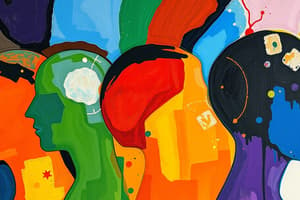Podcast
Questions and Answers
¿En qué etapa del ciclo de vida los infantes dependen completamente de los cuidadores para sobrevivir?
¿En qué etapa del ciclo de vida los infantes dependen completamente de los cuidadores para sobrevivir?
- Infancia (correct)
- Adolescencia
- Vejez
- Adultez
¿Cuál es un ejemplo de un comportamiento crucial de los padres durante la infancia para influir en el estado emocional del infante?
¿Cuál es un ejemplo de un comportamiento crucial de los padres durante la infancia para influir en el estado emocional del infante?
- Mostrarle juguetes complicados
- Ignorar las necesidades del infante
- Cantar canciones de cuna (correct)
- Dejar al infante solo por largos períodos
¿En qué etapa los niños comienzan a desarrollar independencia y aprender autosuficiencia?
¿En qué etapa los niños comienzan a desarrollar independencia y aprender autosuficiencia?
- Vejez
- Adolescencia
- Infancia (correct)
- Adultez
¿Qué destreza se vuelve cada vez más importante para los niños durante la infancia, a menudo comenzando con preescolar?
¿Qué destreza se vuelve cada vez más importante para los niños durante la infancia, a menudo comenzando con preescolar?
¿Qué etapa del ciclo de vida implica un rápido crecimiento físico y desarrollo cognitivo, como aprender a reconocer rostros familiares y desarrollar confianza en otros?
¿Qué etapa del ciclo de vida implica un rápido crecimiento físico y desarrollo cognitivo, como aprender a reconocer rostros familiares y desarrollar confianza en otros?
Durante ¿qué etapa del ciclo vital los niños adquieren rápidamente nuevas habilidades, como entender complejidades del lenguaje y hacer amigos?
Durante ¿qué etapa del ciclo vital los niños adquieren rápidamente nuevas habilidades, como entender complejidades del lenguaje y hacer amigos?
¿Qué edad abarca la etapa de la infancia?
¿Qué edad abarca la etapa de la infancia?
¿Cuáles son algunos cambios físicos que experimentan los adolescentes durante la pubertad?
¿Cuáles son algunos cambios físicos que experimentan los adolescentes durante la pubertad?
¿En qué etapa las personas suelen asumir plena responsabilidad legal y financiera?
¿En qué etapa las personas suelen asumir plena responsabilidad legal y financiera?
¿Qué caracteriza a la vejez en términos de funciones corporales?
¿Qué caracteriza a la vejez en términos de funciones corporales?
¿Cuál es una de las habilidades mentales que los adultos desarrollan para participar plenamente en la sociedad?
¿Cuál es una de las habilidades mentales que los adultos desarrollan para participar plenamente en la sociedad?
¿Qué etapa incluye hitos como obtener licencias de conducir o graduarse de la escuela secundaria?
¿Qué etapa incluye hitos como obtener licencias de conducir o graduarse de la escuela secundaria?
Flashcards are hidden until you start studying
Study Notes
Life Cycle Stages
Humans experience various life cycle stages throughout their lives, which can be broadly categorized into five main phases: infancy, childhood, adolescence, adulthood, and old age. Each stage brings its own unique challenges, opportunities, and experiences. Here's a brief overview of these stages:
Infancy
Infants, typically defined as those from birth up until two years of age, depend entirely on caretakers for survival. Their physical growth is rapid during this time period, with babies doubling their weight within six months after birth and quadrupling it by the end of the first year. Cognitive development also progresses rapidly, such as learning how to recognize familiar faces and developing trust in others. During this early phase, parents play a crucial role in shaping the infant's emotional state through nurturing behaviors like singing lullabies, creating safe environments, and teaching basic social skills.
Childhood
Childhood spans from around ages three to ten, depending on regional definitions. Children during this stage begin to develop independence and learn self-reliance, while still relying heavily on parental guidance. They acquire new skills quickly, such as understanding language complexities, practicing family roles, and making friends. Education becomes increasingly important during childhood, often starting with preschool and transitioning into formal school systems where children learn more advanced academic concepts. This stage prepares them for later transitions, including entering adolescence and eventually becoming adults.
Adolescence
Adolescents, generally classified as individuals between ages eleven and nineteen, face significant changes both physically and emotionally. Hormonal shifts lead to puberty, causing physical developments such as height growth spurts and changes in body shape. Mentally, teenagers become capable of abstract thought and reasoning, allowing them to engage in more complex social interactions and decision making. While challenging, adolescence provides opportunities for personal growth and identity formation. In many cultures, this stage includes milestones like getting drivers licenses or graduating high school.
Adulthood
Adulthood encompasses individuals aged twenty and above, and marks the point when people take full responsibility for themselves legally and financially. It involves pursuing careers, establishing families, and maintaining relationships. Physical maturity allows adults to participate fully in society and engage in activities traditionally reserved for older individuals. Mentally, adult cognitive processes continue to evolve, enabling problem solving, critical thinking, and analytical abilities. Age can bring wisdom gained from past experiences, providing valuable insights and perspectives.
Old Age
Old age signifies the final chapter of one's lifecycle, beginning approximately sixty years of age or beyond. This phase is marked by slowdowns in bodily functions due to natural aging processes like muscle loss and bone density reduction. Despite these declines, mental capacities remain relatively stable throughout old age if proper lifestyle choices are maintained. Relationship building remains vital for seniors who may seek companionship, support networks, and sharing knowledge with younger generations. Engaging in mentally stimulating tasks can help delay cognitive decline, while remaining active socially can ward off feelings of isolation.
Each individual will navigate these stages differently based on circumstances, genetics, and personal choice; however, understanding these common life cycles stages offers insight into human development over a lifetime.
Studying That Suits You
Use AI to generate personalized quizzes and flashcards to suit your learning preferences.




